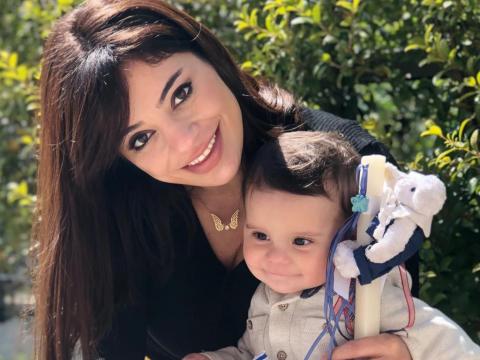Praying God’s gifts for Lebanon

A year on from the Beirut blast that killed 207, Josephine reflects on the crisis her baby boy has been born into.
One year ago, in the wake of the August 2020 Beirut blast, I was asked to share my thoughts as an expectant mother witnessing and living through a national trauma. Twelve months on and this trauma feels never-ending; it turns out that the explosion was only the start of more suffering for the people and children of Lebanon. Here’s a part of what I wrote on the night of August 4, 2020:
"I am a soon-to-be mom. 39 weeks pregnant and waiting eagerly for my baby boy to come to this world. An expectant mother’s worries in 2020 are a lot more complex than expectant mothers in previous years. Add to that, living in the Middle East, and specifically in Lebanon. Bathing a newborn, nurturing him, maintaining a work-life balance in the coming years and everything that comes with child care were matters that I wished were the only worries that crossed my mind. In Lebanon, we are having a rapid increase in the COVID-19 numbers to a point that all we heard on the news was ‘the fear of hospitals becoming stretched soon’.
“Seeing my family and friends calling and checking up on each other brought back so many awful memories that we managed to put behind us from the period of explosions and assassinations from over a decade ago. As the media coverage started and things became clearer, I understood the level of destruction. It was not easy to grasp. Every Lebanese household knows a person who was affected – a missing person, or injured, dead, someone whose house was destroyed, or his/her business, their belongings…It felt like the end of life as all Lebanese people know it. I believe it is – life before the Beirut Blast is not the same as after it. Lebanese people manage to overcome all setbacks and all misfortunes, from the civil war to the constant instability after that, but not this. Not this emotional damage.
“Watching hospitals in Beirut destroyed, the images of nurses running around carrying newborn babies, frightened and confused mothers who just gave birth – all this got me thinking about my child. What awaits him? The greatest worry for every mother is the protection of her children, their well-being, their future. At this time, all I am able to think is: will children in Lebanon even have a future? Will my son be safe and protected?? Will he ever experience the change that all children here deserve?”
At the time I wrote this, I did not yet know that many mothers had lost their children – some as young as two years old. One year on, these mothers’ hearts are still just as broken, and their lives have so utterly changed. One year on and a massive explosion is not the greatest threat to Lebanon’s children. The situation in Lebanon got a thousand times worse on all levels: politically, economically, socially, everything. Thousands of mothers in Lebanon worry about their children more today than they have in recent history. While we remember the disaster that is August 4, children in Lebanon today are the victims of an economic collapse that evolved into a humanitarian crisis. Children in Lebanon are currently at risk of food insecurity, increased child labour and early marriage, and of dropping out of school, all as a result of this other man-made disaster.
As World Vision wraps up our programming response to the explosion, I am proud of our organisation’s success in meeting the needs of children and their families. World Vision rehabilitated over 600 houses, schools and common spaces, provided distressed children with psychosocial support sessions, helped 40 microbusinesses start over, and provided multi-purpose cash assistance as well as food parcels to affected and vulnerable families. We reached half of the hundreds of thousands of people affected by the blast with help over the past year. We managed that because of the generosity of people in Lebanon and around the world who united in support of the victims and survivors of the blast.
That generosity and support gives me and my colleagues hope, which we need right now because those who have endured the distress of the explosion and are now suffering from the lack of food, vaccines and medication, and basic necessities. And as the crisis continues without any obvious solutions on the horizon, our children’s futures, protection, and well-being will keep on depending on the generous hearts around the globe.
My one-year-old son is called Nathan, Gift of God. All children are a gift of God. My request is for people to pray for the vulnerable children in Lebanon, to speak up for them, and to give generously when there is a call to give. Such are the gifts the world can give. I am thankful that Nathan, and all children in Lebanon, can count on these gifts for their future.
Josephine Haddad, is World Vision Lebanon's Public Affairs & Communications Manager.